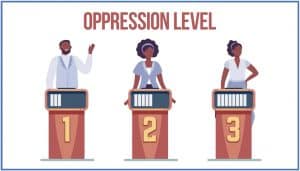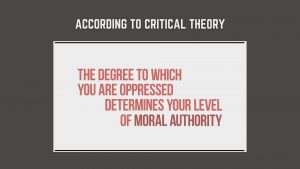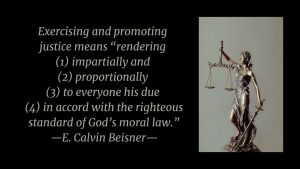Kyle Whitt: Sexual abuse in the SBC is not systemic, and the recently released report from Guidepost Solutions proves it: Epilogue
Unmasking the Social Justice Underpinnings of the Apparent Assumptions of Current SBC Leaders
The SBC is super corrupt and needs to be investigated on that. [The Sexual Abuse Task Force report] punched right, didn’t punch left. It did not punch the real corrupt people in the SBC that have attacked people for exposing issues at their institution or that they helped cover up. It’s like like low-hanging fruit stuff, stuff that people already knew about. Why didn’t they investigate that? We need to be rooting out the errors, not looking for boogeymen.
—Kyle Whitt—
Key point: Southern Baptists must make sure they do not let the tenets of critical theory frame their response to the matter of sexual abuse.
Note: My purpose in writing this article is to uncover several critical, underlying problems in the Southern Baptist Convention and relating to SBC leadership. Some may see these problems as unrelated to the issue of sexual abuse in the convention, but, as I explain in this post, they are very much related. Here is the bottom line: If the tenets of critical theory are not rejected by the convention, and especially if they are not explicitly rejected by SBC leadership (some leaders may need to be replaced before that happens), the matter of sexual abuse in the SBC never will be effectively addressed.
While I believe this is true, I realize that motions to demand the kind of transparency and accountability needed at SBC institutions are not on the table at this time. Messengers to the convention in Anaheim are going to have to decide what to do with the recommendations before them about the matter of sexual abuse. To adequately inform my readers and to equip them to debate and vote wisely, I want to recommend three resources — two articles and a video:
-
-
- Five Key Points for the Southern Baptist Convention Vote on Sexual Abuse Response by Tom Gilson at The Stream, posted June 9, 2022,
- The SBC sexual abuse report and its consequences by Josh Abbatoy at American Reformer, posted June 1, 2022, and
- Explaining Guidepost/Sexual Abuse Task Force Recommendations in the SBC, a Conversations That Matter video podcast with Jon Harris, posted June 7, 2022
-
All of the articles in this series are available from this page.
It was just over a year ago that I published an epilogue, and thus added a fourth article, to a three-part series I’d written that explores the contents of a video made by none other than Kyle Whitt, the gentleman who created the video we’ve been listening to in this series of articles.

The epilogue is titled “Why the Social Justice Movement, Critical Race Theory, and Intersectionality Ultimately are Pharisaical,” and it showcases an important presentation by Joseph Backholm, who then worked for the Colson Center for Biblical Worldview.
Joseph’s presentation is about critical theory. Mr. Backholm asks and answers the question Is critical theory biblical? The video is part of a series titled What would you say? You can watch the Is critical theory biblical? here. Here is an audio clip of the first minute and forty-five seconds of all that Joseph had to say.
Mr. Backholm explains that critical theory claims that
-
-
- 1) “Everyone can be divided into two groups — those who have power, and those who don’t,” and
- 2) “Those who have power always oppress those who don’t.”
-
Critical theory further contends that we know who the oppressors and the oppressed are because “the categories of oppressor and oppressed are based on your group identity. Things like race, gender, religion, immigration status, income, sexual orientation, and gender identity determine whether we are oppressed or one of the oppressors.…Intersectionality,” a component of critical theory, “seeks to measure someone’s level of oppression” as well as to determine who is a member of an oppressive group. Oppressed groups include women, blacks, and homosexuals. If a person is oppressed, his or her degree of oppression is “based on how many of these groups they identify with.”

Joseph explains, “For example, a black man is less oppressed than a black woman, who is less oppressed than a black lesbian.” He continues, “In critical theory, the degree to which you are oppressed determines your level of moral authority.”
It is this statement I want you to understand and remember as our discussion moves forward. This tenet of critical theory is super important. According to critical theory, “The degree to which you are oppressed determines your level of moral authority.”

Acting on an Idea Previously Defended and Upheld
Tuck that statement in your mind and reflect on its implications: The more oppressed you are, the more moral authority you have. Then recall with me that at the annual meeting of the Southern Baptist Convention, meeting on June 11-12, 2019, in Birmingham, Alabama, messengers passed, over strong objections by a significant number, Resolution 9. This resolution upholds critical race theory (a form of critical theory) and intersectionality as “analytical tools.”

The resolution itself said,
Critical race theory is a set of analytical tools that explain how race has and continues to function in society, and intersectionality is the study of how different personal characteristics overlap and inform one’s experience.
It further stated
that critical race theory and intersectionality should only be employed as analytical tools subordinate to Scripture—not as transcendent ideological frameworks.
Despite this disclaimer, because [critical theory,] critical race theory and intersectionality stand contrary to Scripture and have Marxist leanings, use of these, even as “analytical tools,” is incompatible with Scripture and the gospel. And that’s just for starters.

For additional information about critical race theory, intersectionality, and other social justice poisons as they relate to the Southern Baptist Convention, read this article.
At the time of the passage of Resolution 9 in 2019, J. D. Greear was president of the Southern Baptist Convention. He appointed the Resolutions Committee, which was chaired by Curtis Woods, who spoke in favor of Resolution 9 (go here and here), and consequently, in favor of using critical race theory and intersectionality as “analytical tools.” The committee also included Trevin Wax, who, in a series of tweets, explained he did not find the passage of Resoultion 9 problematic.
Fast Forward from the Passage of Resolution 9 in 2019 to 2022
The SBC did not meet for an annual meeting in 2020 because of COVID-19, but in 2021 in Nashville, an effort was made to rescind it. That effort failed, due in part to SBC leadership’s oppressive and manipulative tactics from the platform during convention business.
It is worth noting that J. D. Greear still was president of the convention, since he served an additional one year term because of the convention’s not meeting in 2020. Therefore, Greear and likeminded individuals presided over convention business sessions at the 2021 meeting in Nashville. Unfortunately, the messengers elected Ed Litton SBC president in 2021. Ed is a pastor in the mold of Greear and has continued to take SBC down the same road.
Now, a year later, based on the Sexual Abuse Task Force report from Guidepost Solutions, SBC leaders are saying the following to all Southern Baptists. This is from the Cover Letter and Press Release that accompanied the report. You may recall that Kyle Whitt read a portion of this paragraph in Part 1 of our most recent series.
As the task force, we grieve for what has been revealed in this report. We lament on behalf of survivors for how they have not been protected and cared for as they deserve and as God demands. With broken hearts, we want to lead the way by publicly repenting for what has happened in our convention. We implore our Southern Baptist family to respond to this report with deep repentance and a commitment to the ongoing moral demands of the gospel as it relates to sexual abuse. We must resolve to give of our time and resources to not only care well for survivors of sexual abuse, but to provide a culture of accountability, transparency, and safety as we move forward. We acknowledge that any act of repentance requires ongoing, deliberate, dedicated obedience and sacrifice. This is the calling of our Savior to unite as a body in following after Him.
Now, I want to be very careful here, and very clear. Every instance of sexual abuse is terrible; sexual abuse is a horrific sin. In every situation where it has occurred, abusers must be held accountable and survivors must be supported, helped, and encouraged. Appropriate and responsible actions should be taken in each instance — but such actions do not include those orchestrated by a bureaucratic entity far away.
Every instance of sexual abuse is terrible; sexual abuse is a horrific sin. In every situation where it has occurred, abusers must be held accountable and survivors must be supported, helped, and encouraged. Appropriate and responsible actions should be taken in each instance — but appropriate actions do not include those orchestrated by a bureaucratic entity far away.
There’s more. We need to understand the big picture. While instances of abuse have occurred in some SBC churches, the number of instances of abuse, as we learned in our previous three posts, has been tiny, especially given the size of the SBC.
On top of all of that, there are glaring realities in the Southern Baptist Convention that need to be clearly understood and dealt with; but they haven’t been, despite conservatives’ efforts (including this one) to bring them to the forefront. As we noted in the “Key Points” section of Part 3 of the series just posted, “A problem improperly diagnosed will be ineffectively addressed. Moreover, if the causes of a problem are incorrectly identified, that problem also will be improperly addressed.” I believe the Southern Baptist Convention is about to move ahead to try to “fix” a problem that hasn’t been been accurately and thoroughly diagnosed.
Our goal in all of this must be biblical justice — but unfortunately, there are numerous unmistakable signs that SBC leadership is not pursuing justice according to Scripture, but instead are following the tenets of critical theory, a component of the social justice movement. I know this is a bold accusation, but I have evidence for my claims.
Biblical Justice Contrasts Sharply to the Tenets of Critical Theory
Recall with me the statement I encouraged you to tuck away and remember: “According to critical theory, the degree to which you are oppressed determines your level of moral authority.”

This idea — that “the degree to which you are oppressed determines your level of moral authority” — stands totally contrary to the ideal of biblical justice, as do a number of other assumptions that SBC leaders apparently are holding in response to accusations of sexual abuse within the SBC and the findings of the task force report. Dr. Calvin Beisner has studied the Bible’s teachings on justice thoroughly and observes: “We uphold biblical justice when we render “impartially and proportionally to everyone his due in accord with the righteous standard of God’s moral law.”
Let’s take these one at a time and evaluate the approach SATF members and other SBC leaders are taking in light of them.
Impartiality
First, justice must be rendered impartially. Here I believe it’s important to understand the nature of measures that already have been taken to address accusations of sexual abuse in the SBC. Caring Well is the name given to a conference hosted by the Ethics and Religious Liberty Commission (ERLC) and held in October of 2019. Caring Well also is the title of a corresponding curriculum written to help leaders and churches prevent and deal with sexual abuse and help those who have been violated. In particular, the Caring Well Initiative places a strong emphasis on believing accusers in an unqualified fashion, without question or reservation.
Significantly, at the conference, no male survivors of sexual abuse were platformed. Hearing from women was important, of course; but why were conference attendees not given the opportunity to hear survivor stories from men?
Should women be believed? Of course they should, but not in spite of solid evidence that conflicts with their claims in situations where such evidence arises. Nor should women be believed merely because they are women or simply because of the nature of their accusations. By the same token, certainly, women should not be disbelieved merely for any of these reasons, either. We can make parallel statements about men with stories of abuse, too.
On his Conversations That Matter podcast posted on You Tube on June 4, 2021, Jon Harris critiqued the Caring Well conference and the curriculum and expressed serious concerns about both. Jon writes,
The Caring Well Initiative…paralleled the same kind of thinking behind the Me Too movement’s “believe women” slogan. Women who experienced sexual abuse were more qualified to advise pastors and churches on the topic of sexual abuse than were pastors who rightly understood and applied Scripture’s teaching on the subject. Not only was their voice necessary for solving sexual abuse, but their stories were generally accepted without affirming the importance of verification.

Recall again the assumption of critical theorists: “The degree to which you are oppressed determines your level of moral authority.” It appears that SBC leaders responsible for (and supportive of) Caring Well are following this principle, even to a point of elevating stories of women above those of men, and elevating a victim’s claim to a level of greater authority than that of Scripture or a spiritual leader with experience and integrity. These approaches are problematic.
I readily acknowledge that in the past with regard to this issue, women have not been heard or responded to as they should have been. Yet it is a mistake to allow the pendulum to swing extremely the other way, especially among Christians, where the objective standards of biblical justice out to be sought and consistently applied.
Learn more about Caring Well here. Note carefully that the approach it has taken, and the approach that the Sexual Abuse Task Force is recommending to the SBC, violates the biblical principle of the need for impartiality in dispensing justice. In an article titled “The SBC Sexual Abuse Report and its Consequences,” lawyer and Southern Baptist Josh Abbotoy warns,
Perhaps the most noteworthy of the SATF report’s recommendations is the creation of an Offender Information System (OIS) that would be created and maintained by the new Administrative Entity. The OIS would be public and would include a list of persons “legally convicted, personally confessed, or those having been credibly accused or having substantiated allegations of acts including sexual abuse.” “Credibly accused,” in turn, is defined to mean “not manifestly false or frivolous.” Including the “credibly accused” on a public list shifts the burden of proof from the accuser to the accused. Or to put it another way, it means that the accused will be considered guilty until proven innocent, which is a basic violation of biblical justice.
Consider as well that this policy would either effectively or in fact violate due process, a procedure that impartiality assumes and Scripture explicitly demands (go here and here).
Proportionality
Second, proportionality is essential to rendering authentic justice. This means making sure the consequences meted out for offenses are appropriate for the offenses committed. While the report isn’t about one specific individual’s misdeed but about those committed by offenders (plural), I believe that SBC leadership has done little or nothing to mitigate the emotional climate that sends people rushing madly to defend accusers and condemn the accused — even before evidence is gathered in specific cases. This will work decidedly against the dispensing of justice in proportionally appropriate ways, but the SBC leadership doesn’t seem to care.
It has to be noted that when Grant Gaines’ motion was voted on at the Convention, the emotional climate basically told messengers, “If you don’t support this, you are indifferent to, and even complicit in, sexual abuse.” Afterward, when members of the EC who were acting with their heads and not just with their hearts sought to apply the brakes to the foolish idea of jettisoning attorney-client privilege, the tenor and mood of SBC news outlets and leaders was to effectively accuse them of having something to hide, even if this wasn’t done overtly. This was unfair and wrong.
Actually, SBC leadership frequently resorts to emotional manipulation to get its way. This works against proportionality as well. In other words, dispensing authentic justice requires level-headed thinking, which necessarily means rejecting temptations to respond in ways that are purely emotional and reactionary.
Justice is not well served in climates like this. First, we should intentionally step back and let our emotions cool. Next, we should look at the information before us objectively, at least to the degree that we are able. Along these lines, this clip from Kyle that we highlighted in Part 1 helps us get a grip on reality.
Individual Responsibility
Third, those who uphold authentic justice do so by “rendering…everyone his due.” This means offering proportionate consequences for misdeeds, as we just discussed, but it means as well giving everyone his due. Justice is about individuals, not groups, but critical theory sees people in terms of their group identities. Unfortunately, it appears that SBC leadership is viewing people and evaluating them in terms of their group identities as well.
We see the attitudes and perspectives of SBC leaders on this matter reflected in the Caring Well Initiative and in the Caring Well curriculum. Accusers are victims. An accuser actually might not be a victim, but if all accusers are to be believed, then they are victims by virtue of having leveled accusations. You see, according to critical theory, women have been, and are, oppressed, simply because they are women and because a patriarchal society oppresses them and keeps them from reaching their full potential. Since they are oppressed, they have greater moral authority. These aren’t just components of critical theory. They also appear to be is the messages that SBC leadership, as well as the SBC Sexual Abuse Task Force, are sending to Southern Baptists at large.
We see yet another piece of evidence that leadership is evaluating people in terms of group identities rather than as individuals in the Cover Letter and Press Release that accompanied the report. We quoted a paragraph from that letter earlier. Carefully note this sentence: “We implore our Southern Baptist family to respond to this report with deep repentance and a commitment to the ongoing moral demands of the gospel as it relates to sexual abuse.” The underlying message is clear. If you’re a Southern Baptist, you need to repent of your role in sexual abuse, even if you’ve had no actual role in it, and even if you’ve worked to oppose it for many years, as has the Southern Baptist pastor whom we quoted at the opening part 3. He wrote these statements roughly two weeks before the annual meeting of the SBC in Anaheim:
I’m starting to dread Anaheim. Every speaker is going to begin by saying this is a time for lamenting, a time for grieving, a time to repent in sackcloth and ashes. I’ve been grieving over sex abuse in our churches since 2003. I don’t need anyone to make a big show about it just because of this report. But I’m dreading the melodramatic calls for us to change our wicked ways, all the virtue signaling and the emotionally charged manipulation appeals….all designed to get the crowd in a certain frame of mind so that we favor whatever they want us to support. I absolutely despise sexual abuse. But I’m really not in favor of emotional manipulation and guilt trips either.
Corporate guilt is one of the tenets of critical theory. According to critical theory, whites are guilty of racism simply because they are white and have supposedly benefited from a system that favors them over blacks. Blacks — even those who aren’t victims — are victims, simply because they are black.
Apply this approach to sexual abuse, and people are victims or abusers (or lean one way or the other) simply on the basis of their being women, or men, or accusers, or accused. Also, one gets the sense from SBC leadership that if you haven’t been actively opposing sexual abuse, you contributed to it in a positive way, as if you had promoted it. Rendering biblical justice doesn’t work this way. Rather, rendering biblical justice means working to make sure “everyone gets his due” — that which he or she actually deserves — based on actions taken as an individual.
Upholding God’s Law
Fourth, those who promote and uphold biblical justice do so when they render everyone what he or she deserves “according to the righteous standard of God’s moral law.” It is God who has moral authority, and He has expressed that authority in and through His laws. First and foremost, therefore, when believers uphold justice, they consistently obey God in their own personal lives. They live pure and blameless lives, conducting themselves in ways that ultimately compel their non-Christian neighbors and family members to glorify God in heaven.
First and foremost, when believers uphold justice, they consistently obey God in their own personal lives. They live pure and blameless lives, conducting themselves in ways that ultimately compel their non-Christian neighbors and family members to glorify God in heaven.
There’s more. Adhering to the moral and ethical teachings of God as revealed in His Word, the Bible, requires intentionality, objectivity, discernment, and discipline. All of these are needed to resist emotional impulses, which sometimes will work against upholding the truth. This is especially true about emotional impulses manifested among crowds. Remember that ultimately, the truth is loving, for love “rejoices in the truth.”
Upholding justice in our culture requires something else, as well: a commitment to God and His laws that consistently trumps any desire to be popular or liked by the world. In an environment where justice is upheld, virtue signaling becomes a thing of the past.
In an environment where justice is upheld, virtue signaling becomes a thing of the past.
While we frequently have heard from SBC leadership that “the world is watching”; for the most part, we have not been reminded by denominational leaders that “God is watching” and that Southern Baptists need to please Him, regardless of what the world thinks or how it might respond.
The Bottom Line
I believe that the initial step the SBC needs to take in dealing with the issue of sexual abuse is to reject all the tenets of critical theory that seem to be, and are, driving the agendas of the denomination’s current leadership. Southern Baptists need to become very well acquainted, and reacquainted, with biblical justice.

Southern Baptists need to become very well acquainted, and reacquainted, with biblical justice.
This needs to start with SBC leadership. If what I wrote in our discussion about the necessity of living exemplary lives (see the fourth item), applies to anyone in the SBC, it has to apply to denominational leaders. Josh Abbotoy, whom we quoted earlier, also wrote this:
We should expect coordinated action or perhaps even class action lawsuits against the SBC if it takes the path suggested by the SATF. We should also expect state attorney generals (particularly in Democratic states) to open investigations against the SBC, echoing the investigations against the Catholic Church’s abuse scandal.
The Road not Taken
In all of these matters, there is a road not taken. The SBC has endemic governance issues. These issues primarily flow from SBC entities that are not held accountable. Boards of trustees are hopelessly conflicted, often widely populated with trustees who themselves are employees of other SBC entities. Training is poor and bylaws and policies are frequently disregarded. Boards of trustees tolerate countless misdeeds that would form the basis of litigation for breach of fiduciary duty in the context of a for-profit corporation. In fact, mishandling or ignoring abuse cases by SBC entities is just one symptom of these accountability issues. Other symptoms include quid pro behavior, unapproved golden parachutes, dictatorial/unaccountable leadership styles, lack of transparency, disregard of bylaws and policies. All of these behaviors are scarcely known amongst the gentiles in their for-profit corporations. SBC entity boards should be reformed in a way that minimizes these conflicts and maximizes the number of church pastors and faithful lay members with business and management backgrounds. Without doing anything to address the underlying accountability issues, the SATF’s recommendations are mere band-aids. At the same time, because they give SBC entities so much discretionary power, they are tools that will be easily employed by those in control to punish rivals or political enemies.
Leaders and messengers of the SBC need to start having reasoned discussions about these matters now. The SBC will need leaders who have discernment, moral clarity and a backbone. Those running for leadership in the SBC must use their platforms in the coming two weeks to lead the way on deliberations about proposing constructive paths forward [Mr. Abbotoy’s article is dated June 1, 2022]. Given the emotional fervor behind this issue, suing for prudence at this moment may feel a bit like stepping in front of a freight train, but we cannot afford to have our discussions shut down over fear. The enemies of the church would love nothing more than for the SBC to destroy itself. Now is the time for those who desire to see the SBC flourish and remain faithful in coming years to stand up and speak.
With his warnings and recommendations, Josh Abbotoy points the SBC to the path of biblical justice. When biblical justice is upheld, we can be assured that leaders will be compelled to lead effectively and with integrity. Probably numerous leaders, even employed ones, will need to be replaced.
Further, we also can know that when biblical justice is upheld the best efforts are being made to hold offenders accountable, to affirm and support victims, to protect women and children, to exonerate the innocent, and to treat all people fairly. And here’s the most important part. In such a climate, Southern Baptists would be, and will be, honoring God.
Much more needs to be done, but this, it seems to me, is the place where Southern Baptists need to start.
Copyright © 2022 by B. Nathaniel Sullivan. All rights reserved.
Unless otherwise indicated, Scripture has been taken from the New King James Version®. Copyright © 1982 by Thomas Nelson, Inc. Used by permission. All rights reserved.
top photo credit: Photo by Tingey Injury Law Firm on Unsplash


[…] than exerting a prophetic witness unique to the church, the country’s largest denomination was arm-wrestled into adopting the same oppressor-oppressed power dynamic that marks the leftist […]